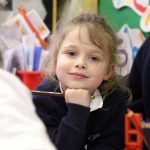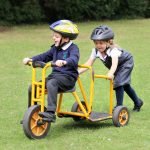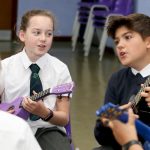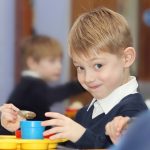TEACHING AND LEARNING POLICY
AIMS OF THE POLICY
This policy, has been created by and agreed upon by the teaching staff and Governing Body.
At Clavering Primary School we are committed to high quality teaching and learning to raise standards of achievement for all children. All teachers and governors have been consulted in developing this policy, which summarises expectations and common working practices. It reflects what has been agreed in terms of approach and consistency and makes explicit the best practice to which the school aspires. It also reflects the aims and objectives of the school and supports its vision.
This policy should be read in conjunction with our subject policies.
PRINCIPLES OF TEACHING AND LEARNING
Learning is the purpose of the whole school and is a shared commitment. At Clavering Primary School we recognise that education involves children, parents, staff, governors, the community and the local authority, and that for optimum benefit all should work closely together to support the process of learning. Working in partnership, we aim to:
- provide a supportive, positive, healthy, caring and safe environment, which has high expectations and values all members of the school community;
- recognise the needs and aspirations of all individuals and provide opportunities for all pupils to make the best possible progress and attain the highest personal achievements;
- ensure children can develop as literate, numerate and technologically competent individuals, within a broad, balanced, exciting and challenging curriculum;
- provide rich and varied contexts and experiences for pupils to acquire, develop and apply a broad range of knowledge, skills and understanding;
- provide a curriculum which promotes the spiritual, moral, social, cultural, physical, mental and emotional development of the pupils;
- develop individuals with lively, enquiring minds, good thinking skills, self-respect, self-discipline and positive attitudes;
- encourage all children to be enthusiastic and committed learners, promoting their self -esteem, self-worth and emotional well-being;
- develop children’s confidence and capacity to learn and work independently and collaboratively;
- develop enduring values of respect, honesty, equality, integrity, tolerance, fairness and trust;
- encourage children to respond positively to the opportunities, challenges and
- responsibilities of a rapidly changing world;
- encourage children to value the diversity in our society and the environment in which they live;
- encourage children to become active and responsible citizens, contributing positively to the community and society.
As a school, we are committed to our mission statement – ‘Learning together to be the best that we can’
Ethos
The ethos and atmosphere underpin the agreed aims of the school. In the course of their daily work the staff will contribute to the development of this ethos through:
- providing a calm and effective working environment, in which each child can produce his or her best work;
- providing a welcoming environment, in which courtesy, kindness and respect are fostered;
- providing positive role models;
- providing a fair and disciplined environment, in line with the school’s behaviour policy;
- effective management of their professional time;
- developing links with all stakeholders and the wider community;
- valuing and celebrating pupils’ success and achievements;
- reviewing personal and professional development in order to ensure a high level of professional expertise.
Roles and Responsibilities
Learning and teaching is a shared responsibility and all members of the school community have an important part to play. (See Home-School Agreement)
All members of the school community should work towards the school’s aims by:
- esteeming children as individuals and respecting their rights, values and beliefs;
- fostering and promoting good relationships and a sense of belonging to the school community;
- providing a well ordered environment in which all are fully aware of behavioural expectations;
- offering equal opportunities in all aspects of school life and recognising the importance of different cultures;
- encouraging, praising and positively reinforcing good relationships, behaviours and work;
- working as a team, supporting and encouraging one another.
Teachers will endeavour to:
- provide a challenging and stimulating curriculum designed to encourage all children to reach the highest standard of achievement;
- recognise and be aware of the needs of each individual child according to ability and aptitude;
- ensure that learning is progressive and continuous;
- be good role models, punctual, well prepared and organised;
- keep up-to-date with educational issues;
- provide clear information on school procedures and pupil progress;
- have a positive attitude to change and the development of their own expertise;
- establish links with the local community to prepare pupils for the opportunities, responsibilities and experiences of life;
- work collaboratively with all involved in education to develop a shared philosophy and commonality of practice.
Parents are encouraged to support their child’s learning by:
- ensuring that their child attends school regularly, punctually, well-rested and in good health;
- ensuring that their child arrives at school wearing the correct uniform and bringing necessary equipment;
- providing support for the discipline within the school and for the teacher’s role;
- supporting the work of educational targets and becoming actively involved in the implementation of any support programme;
- participating in discussions concerning their child’s progress and attainment;
- ensuring early contact with school to discuss matters which affect a child’s happiness, progress and behaviour;
- support the school’s homework policy and give due importance to any homework;
- ensuring that all contact addresses and telephone numbers are up to date and correct;
- allowing their child to become increasingly independent as they progress throughout the school;
- informing the school of reasons for their child’s absence;
- actively supporting the Home-School Agreement.
Pupils are encouraged to support the school’s aims by:
- attending school in good health, maintained by adequate diet, exercise and sleep;
- attending school regularly and punctually;
- being organised, bringing necessary equipment, taking letters home promptly, etc;
- conducting themselves in an orderly manner in line with the expected behaviour policy;
- taking increased responsibility for their own learning.
The community is invited to support the school by:
- contributing to activities, such as assemblies, specialist outings, clubs, etc;
- presenting themselves as positive role models to be emulated;
- organising activities and events throughout the year to extend and deepen pupils’ knowledge and skills;
- supporting school events;
- voluntarily helping in the classroom.
Planning
The foundation for curricular development is the School Improvement Plan, developed through a process of collaboration between staff, and approved by governors.
At Clavering Primary School we are committed to following the programmes of study as required by the National Curriculum 2014. A cycle of National Curriculum Programmes of Study is drawn up by staff and is carefully balanced to ensure full coverage of the National Curriculum, PSHCE and RE. We follow a cross curricular approach to learning where some subjects are taught through a topic and some are covered as discrete subjects. Regular staff meetings are used to discuss various aspects of the curriculum and ensure consistency of approach and standards.
Planning takes place termly, with reference to the National Curriculum 2014, Early Years Foundation Stage and the Whole School Long Term Curriculum Plan. Swimming instruction with specialist teachers takes place at the local swimming pool,
Termly plans are submitted to the Deputy Headteacher and weekly plans for English, Mathematics and foundation subjects are displayed in classrooms at the beginning of each week. Plans are based upon previous assessment data, pupil need and subject expectation. Curriculum time can be planned as continuous study throughout the term, or as blocks of study. At Clavering Primary School we are committed to raising standards of basic skills. By basic skills, we mean the ability to read, write and speak in English and to use Mathematics at a proficient level to facilitate learning across the curriculum.
Subject leaders have a variety of roles. These include:
- taking the lead in policy development and the production of schemes of work designed to ensure progression and continuity in their subject throughout the school;
- supporting colleagues in their development and implementation of the scheme of work, and in assessment and record-keeping activities;
- monitoring progress in their subjects and advising the Headteacher on action needed; taking responsibility for the purchase and organisation of central resources for their subjects;
- using release time to support colleagues;
- keeping up-to-date through reading and attending relevant courses.
Teachers ensure breadth and balance to the curriculum and endeavour to make use of cross curricular opportunities to enhance learning.
Organisation
The learning environment will be managed in such a way as to facilitate different styles of learning.
Opportunities will be made for:
- whole class teaching;
- group work, organised according to appropriate criteria (i.e. ability, mixed ability, friendship, etc);
- one to one teaching;
- conferencing;
- collaborative learning in pairs or groups;
- independent learning.
All areas of the learning environment will be planned for, including, where appropriate, the outside areas, in order to ensure opportunities for a range of practical activities, which will develop appropriate knowledge, skills and understanding.
The classroom will be organised to facilitate learning and the development of independence. For example:
- resources in each area will be grouped according to curriculum subject;
- book corners will be comfortable and attractive;
- labels and posters should be used wherever possible/appropriate to reflect the language diversity in the school;
- areas for imaginative play will change regularly, in order to give opportunities for a range of play and role-play which will contribute to learning in a purposeful manner;
- pupils will be involved in the maintenance and care of all equipment and resources.
Classrooms provide a stimulating and purposeful learning environment, including thought provoking and stimulating displays.
Classroom support is available in the form of both learning support assistants and volunteers. These are used at the discretion of the classteacher. Volunteer helpers assist with the many aspects of school life, including supporting reading and providing assistance with school visits. Students are welcomed into school and certain standards of dress and conduct are expected.
Excellence is celebrated in display and performance. Each child is given an opportunity to have work displayed during the school year. Sustained effort, including drafting and reworking, is encouraged to enhance standards. School events such as performances and assemblies are seen as opportunities for all pupils to demonstrate their own best performance. Pupils are encouraged to believe that any exhibited work (performance or display) should represent their highest standards of personal achievement. ‘Star of the Week’ awards are given weekly to celebrate individual academic or behavioural achievement. ‘Headteacher Awards’ are given every half term to two pupils in each class for achieving their personal best in an area of learning. The ‘It Didn’t Go Unnoticed Award’ is given every week to a pupil or pupils that have been identified by Playleaders, Midday Assistants or Kitchen Staff on the ‘Playground Good News Wall’ for exemplary behaviour.
Differentiation
So that we always have the highest possible expectations of individual learners and so they can demonstrate what they can do, understand and achieve, teachers will differentiate the curriculum according to individual needs by:
- pace;
- content;
- task;
- relevance;
- resources;
- extension;
- autonomy;
- outcome;
- teacher/adult support.
Differentiated tasks will be detailed in weekly planning. Learning objectives will be specified for all differentiated teaching and reference will be made in weekly plans to individual Learning Plans where appropriate.
Pupils with special educational needs (including gifted and talented children) receive support provided by a learning support teacher, 1:1 Tuition or our inclusion manager where appropriate. Extra support is given in the classroom from learning support assistants. Additionally, advice is sought from relevant external support agencies when and where the need demands it. (See Special Educational Needs Policy)
Teachers set individual targets each term per child in English and Mathematics. This is in addition to the formative assessment targets the teachers communicate to the children on a weekly or daily basis where appropriate. These are shared with the child and parents to encourage partnerships in learning.
Homework
Homework is considered to be a valuable element of the learning process. (See Homework ‘Learning Log’ Policy)
At Clavering School, we use Learning Logs to encourage parents to work with their children at home. The Learning Logs are a more individual way to do homework and provide the children with an opportunity to reflect on their learning and to develop their independent thinking skills. Children are expected to take pride in their work and keep their Learning Logs neat, but they can be as creative as they like and present their work in a style which they prefer. Additional, more formal activities may be set by the teacher depending on the needs of the children.
We believe that homework should be set:
- to involve parents in their children’s learning;
- to help parents keep abreast of what their child can and cannot do;
- to take advantage of the home context to apply learning;
- to encourage children to talk about their work to their parents and explain what they are doing and how;
- to extend the time for learning, thus enabling children to practise and consolidate their skills and knowledge and strategies;
- to prepare children for secondary school experiences of homework;
- to view learning as a life long process and not just restricted to school hours.
The school’s agreed practice for homework is that:
- homework is set on a regular basis, for all years, in line with our homework policy;
- homework will generally follow on from work which has taken place in class but may take many different forms, including reading, learning multiplication facts and spellings. It should not entail new ideas that require explanation from a teacher;
- homework may sometimes consist of preparation for work yet to be done;
- children should understand exactly what they are expected to do, how to do it, and how long it should take;
- homework should sometimes involve the participation of the parents;
- children who have made insufficient effort during class time may occasionally be asked to complete work at home.
Assessment, Recording and Reporting
Regular assessments are made of pupils’ work in order to establish the level of attainment and to inform future planning. Formative assessment is used to guide the progress of individual pupils. It involves identifying each child’s progress in each area of the curriculum, determining what each child has learned and what therefore should be the next stage in his/her learning.
Formal summative assessment is carried out at the end of each National Curriculum Key Stage (i.e. in Years 2 and 6) through the use of SATs and teacher assessment. Phonics are tested in Year 1 and re-tested where necessary in Year 2. Optional tests are also taken in Years 3, 4 and 5. Initial assessment is used in Reception/Early Years within six weeks of starting school and Foundation Stage Profiles are maintained.
Suitable tasks for assessment include:
- group discussions;
- short tests in which pupils write answers;
- specific assignments for individual pupils;
- discussions in which children are encouraged to appraise their own work and progress;
- pupil observations;
- SATs.
Feedback to pupils about their own progress is achieved through discussion and the marking of work. Effective marking:
- helps children understand how to improve and comments aim to be positive and constructive;
- is often done while a task is being carried out through discussion between child and teacher;
- of written work is used sensitively and with discretion so that a child can assimilate a limited number of corrections at one time. This will vary according to the age, ability and task.
All results from assessments are analysed and used to inform future planning. (See Assessment Policy)
Cross phase continuity is ensured by:
- pre-school liaison meetings;
- cross-phase liaison meetings;
- in-school liaison meetings between staff;
- liaison meetings between Year 6 teachers and those from prospective secondary schools;
- visits to secondary schools by Year 6 pupils;
- transfer of pupil records of progress and summative assessment results.
Records of progress kept for each child are:
- updated as a minimum annually by teachers;
- examined by classteachers at the start of each academic year as they prepare for a new class;
- retained throughout the child’s time at the school and appropriate records passed on to other schools when pupils leave.
Reporting to parents is done three times a year through consultations and twice through a written report. Results of individual pupils’ assessments are made available to the parents concerned and the overall statistical profile (but not individual results) is made available to parents, governors, LA and national government.
Monitoring and Evaluation
Pupils’ work will be monitored and moderated regularly in each of the core curriculum areas by the subject leaders and the Deputy or Headteacher. A termly review of monitoring procedures is held with all members of the teaching staff in the form of Pupil Progress Meetings which includes discussions around our whole school Provision Map and the impact of the interventions that are used. Subject leaders will regularly monitor children’s books. The Headteacher will observe each classteacher in a specified curriculum area on a regular basis. The Performance Management cycle informs learning and teaching. (See Performance Management Policy).
Teaching Strategies and Styles
In order to ensure equality of access and effective matching of tasks to needs, teachers will employ a variety of teaching strategies in any one session. This will include:
- provision of an integrated curriculum;
- teacher observation;
- discussion and questioning (open and closed as appropriate);
- previewing and reviewing work;
- didactic teaching;
- interactive teaching;
- conferencing;
- listening;
- brainstorming;
- providing opportunities for reflection by pupils;
- demonstrating high expectations;
- providing opportunities for repetition/reinforcement;
- providing encouragement, positive reinforcement and praise;
- making judgements and responding to individual need;
- intervening, as appropriate, in the learning process in order to encourage development;
- providing all children with opportunities for success;
- using a range of communication strategies – verbal and non-verbal.
Activities should show a balance in terms of individual, group and whole class work. Specialist teaching is available from subject leaders when they can be released from class and also in the form of visitors.
The emphasis of our policy is on a good variety of experiences and we encourage children increasingly to take an active role in their own learning. Thus:
- investigative work is used;
- children are encouraged to communicate findings in a variety of ways;
- opportunities are provided for children to become involved in decision making and to take responsibility, along with staff, for their own learning.
At Clavering Primary School we recognise the importance of key skills. Opportunities will be made available across the curriculum to develop:
- application of number;
- communication;
- computing skills
- problem solving;
- working with others;
- improving own learning and performance.
Thinking skills will also be developed across the curriculum. This will include:
- creative thinking;
- enquiry;
- information processing;
- reasoning;
- evaluation.
At Clavering Primary School we recognise the importance of formative assessment and the important role it has to play in creating a learning culture. We believe that formative assessment furthers and deepens learning and consists of four basic elements, underpinned by confidence that every child can improve and an awareness of the importance of children’s high self-esteem. The four elements are: sharing learning goals; effective questioning; self and peer evaluation; effective feedback. Formative assessment carries with it the expectation that, when properly motivated and appropriately taught, all learners can reach a level of achievement which may currently appear beyond them. It provides a breadth of proven life-long learning skills based on an understanding of how we learn rather than what we ought to be learning. This includes:
- creating a positive learning environment;
- focusing all feedback on specific performance improvements which can be acted on;
- sharing an overview of content, process and benefits of the learning to come;
- engaging learners by posing problems and challenging thinking;
- providing opportunities for learners to meet the challenge in a variety of pairings and with multiple ways of representing their understanding;
- creating space for reflection and meaningful dialogue;
- reviewing what has been learned, how it was learned and how it will be used.
Learning Processes and Learning Styles
Children enter school at different stages of development. Children learn in different ways and at different rates of progress. In the course of learning, children develop their skills through a variety of processes and learning styles. These include:
- investigation;
- experimentation;
- listening;
- observation;
- talking and discussion;
- asking questions;
- child-initiated play;
- practical exploration and role play;
- retrieving information;
- imagining;
- repetition;
- problem-solving;
- making choices and decision-making.
At Clavering Primary School opportunities are organised to allow pupils access to these processes, and for them to develop their own strategies to gain knowledge and skills. We aim to provide opportunities to develop a wide range of learning styles. We recognise that each child has a unique way of learning and that learning preference is affected by previous experience, competence, confidence, beliefs and values. We shall ensure that learning is accessed by as many means as possible, e.g. VAK. Staff are aware of a range of theories and research linked to learning including encouraging a ‘Growth Mindset’.
Planning will incorporate as many styles of working as possible. These styles include:
- individual learning;
- collaborative learning in small groups, or pairs;
- one to one learning with an adult, or more able pupil;
- whole class;
- independent learning.
Group work may include friendship, matched ability, mixed ability, etc, appropriate to the activity. Collaborative learning is encouraged, although some periods of the day may be set aside for silent work.
Teachers at Clavering feel that pupils learn best when:
- they are happy, healthy and alert – receptive and positive
- they are interested and involved – learning is relevant and stimulating
- the purpose of a task is understood – they understand why they are doing it
- they feel secure – in terms of environment, relationships and learning
- they feel valued – teachers and other adults care about their development as learners
- they have opportunities to explore and take risks
- they are actively involved, making choices and taking responsibility in their learning
- they have an element of control and can work with independence
- they receive positive feedback and praise for achievements
- the learning environment is well-organised and resources are easily accessed
- tasks are differentiated, matched to the child
- learning is built on existing knowledge and experience – clearly defined small steps
- they have opportunities to talk about their work, reflecting, discussing and sharing ideas
- the teacher is knowledgeable, enthusiastic and motivated
- they have clearly defined targets which they can successfully achieve eg appropriate time scale
Effective learning is ensured through the process of monitoring successful teaching (see monitoring policy) and pupil’s learning outcome i.e. Baseline Assessment, reading ages and SAT results.
Successful teaching takes account of children’s prior learning and must ensure continuity and progression.
Linked to the above, successful teaching is:
- confident – teachers have a clear understanding of subject knowledge and setting objectives
- high expectation – there is optimism about, and high expectation of success
- well planned – there is differentiation with methods and organisation strategies which match curricular objectives and needs of all pupils
- interactive – pupil’s contributions are encouraged, expected, extended
- characterised by high quality oral work
- well paced – there is a sense of urgency, driven by the need to make progress and succeed
- informed – by assessment outcomes
Resources
Classroom and central resources are the responsibility of classroom teachers and subject leaders who ensure that:
- there is a range of appropriate, accessible and labelled resources available for which pupils can select materials suitable to the task in hand;
- all children know where classroom resources are kept and the rules about their access and use;
- children are encouraged to act independently in choosing, collecting and returning resources where appropriate;
- the library is a valued resource and used appropriately;
- children work together to establish an attractive, welcoming and well organised environment engendering respect, care and value for all resources.
Each classroom will be equipped with a basic set of resources and books appropriate to the age range. Specialist resources will be stored in the appropriate curriculum resource cupboard/area, and will be regularly audited by the subject leaders. Consumables will be replenished as necessary. Staff may contact subject leaders with suggestions for specialist materials which may need ordering.
Pupils will be taught how to use all resources correctly and safely, with care and respect and with regard for Health and Safety and waste. Care will be taken to ensure that resources reflect the cultural and linguistic diversity of our society, and that all pupils have equality of access.
At Clavering Primary School the use of visits and visitors to enrich the curriculum is valued and these are used throughout the school to widen children’s experiences and support learning across a range of subject areas.
Time is a resource that we value. To maximise its use:
- as children progress throughout the school they are encouraged to take greater control of their own learning, including their use of time;
- opportunities for learning are maximised by ensuring that tasks are made specific by focused objectives;
- teachers will encourage pupils to work within given time scales, and will facilitate the effective use of time through the provision of appropriate resources and planning extension activities;
- all children engage in useful activities upon entering the classroom and know what to do between the end of an activity and the end of a session.
Computing is a major resource, which is used across the whole curriculum.
Health and Safety issues are the responsibility of all who work in the school. Two members of staff are nominated as Health and Safety representatives and all problems should be reported to them. These are the Headteacher and Site Manager.
Last reviewed: November 2023














